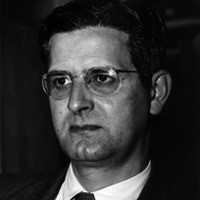São Paulo (Brasil), 1907 – 1990
By Oswaldo Munteal Filho and Jacqueline Ventapane Freitas
Born into a wealthy and influential family in São Paulo, Caio Prado Júnior graduated in 1928 with a degree in legal and social sciences. His first work, Evolução Política do Brasil (The Political Evolution of Brazil), published in 1933, was also the first analysis of Brazilian history to consistently use historical materialism. In it, he dismissed the notion of feudalism in colonial Brazil as mere “rhetorical flourish,” although he acknowledged that the captaincy system was “characteristically feudal.”
In Formação do Brasil Contemporâneo (The Formation of Contemporary Brazil), published in 1942, Prado argued that understanding Brazilian history requires uncovering its meaning, which, he claimed, was defined during the colonial period. He began his analysis in the early 19th century, when colonial endeavors ceased, and traced back to the mercantile expansion of the 15th and 16th centuries. Prado contended that Brazil’s colonial character persisted in the structuring of its society, shaped by specialized agricultural production for the European market through monoculture estates.
In 1943, he founded the publishing house Brasiliense, which would later launch the magazine Brasiliense in 1955, a cornerstone of Brazilian critical and nationalist thought. In 1945, he published História Econômica do Brasil (Economic History of Brazil), addressing issues such as industrialization, imperialism, and economic and financial life, topics that had been insufficiently explored until then. Two years later, Prado was elected to the state legislature as a member of the Brazilian Communist Party (PCB), though his mandate was revoked when the PCB was declared illegal.
Caio Prado Júnior was part of a movement in the 1930s that revolutionized the way Brazilian history was understood, challenging the prevailing thesis that Brazil was a nation without a people. Thanks to the decisive contributions of Prado, alongside Sérgio Buarque de Holanda and Gilberto Freyre, new paradigms emerged—such as race, modernization, tradition, patriarchy, and revolution—that became integral to intellectual and academic discourse in Brazil. In this context, Evolução Política do Brasil, Formação do Brasil Contemporâneo, and História Econômica do Brasil represent systematic efforts to integrate Marxist concepts with detailed narratives of key events in the country’s socio-political evolution. These works demonstrated a rigorous concern with method and theory, exerting significant influence on universities and readers alike.
Persecuted after the 1964 military coup, Prado was forcibly retired by the dictatorship in 1968 and imprisoned from 1970 to 1971, before being acquitted by the courts. Prior to this, he addressed his critics and interpreters with the publication of A Revolução Brasileira (The Brazilian Revolution, 1966), which earned him the Juca Pato Award and the Intellectual of the Year Prize from the Brazilian Writers’ Union. In this work, and later in A Questão Agrária no Brasil (The Agrarian Question in Brazil, 1979), Prado revisited the Marxism that had informed his earlier writings. He argued that many who studied his work failed to deeply engage with the concepts and categories of critical theory. In A Revolução Brasileira, he noted that the tradition of leftist thought in Brazil had often reversed the proper methodological process—starting not with an analysis of facts to derive concepts for structuring theory, but instead beginning with established theoretical texts and frameworks, then fitting facts to them. He critiqued the PCB and its simplistic portrayal of Brazil’s capitalist history, broadening his formulations by incorporating Italian Marxist ideas and rejecting the Stalinist orthodoxy prevalent among communists at the time.
Caio Prado Júnior passed away in 1990, leaving behind a decisive legacy for Brazilian and Latin American historiography and social thought.



